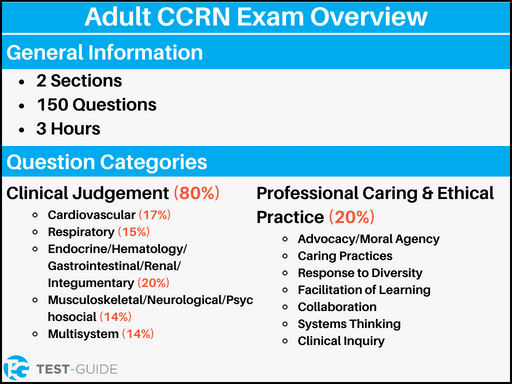The Critical Care Nurses Certification (CCRN) is a certification granted by the American Association of Critical-Care Nurses (AACN). Answer the CCRN practice questions below to begin your studies!
The CCRN certification shows that you have the special knowledge required for acute and critical care nursing. More than 95,000 acute and critical care nurses currently carry this certification.
| Resource | Notes | Provider |
|---|---|---|
| CCRN Set 1 | Practice 185 CCRN test questions | Quizlet |
| CCRN Set 2 | Practice 104 CCRN exam questions | Quizlet |
| CCRN Set 3 | Practice 92 CCRN questions | Quizlet |
| CCRN Set 4 | Practice 41 exam questions | Quizlet |
| CCRN Practice PDF 1 | Practice 120 CCRN questions in PDF format. | CACCN |
| CCRN Practice PDF 2 | Starts on page 19 of PDF. | Life Bridge Health |
Adult CCRN Test Outline
The CCRN exam is split into two sections (clinical judgment and professional caring and ethical practice). The majority of the questions will be in the clinical judgment section.
Quick Facts:
- Number of Questions: 150
- Time Limit: 3 Hours
- 2 Sections: Clinical Judgment (80%) and Professional Caring and Ethical Practice (20%)
- Other Info: 25 of the 150 Questions are Unscored. Multiple Choice Questions.
Clinical Judgment (80%)
This portion of the exam consists of 5 subtopics:
- Cardiovascular (17%)
- Respiratory (15%)
- Endocrine, Hematology, Gastrointestinal, Renal, Integumentary (20%)
- Musculoskeletal, Neurological, Psychosocial (14%)
- Multisystem (14%)
Professional Caring and Ethical Practice (20%)
- Advocacy/Moral Agency
- Caring Practices
- Response to Diversity
- Facilitation of Learning
- Collaboration
- Systems Thinking
- Clinical Inquiry

Adult CCRN Requirements
If you would like to sit for the adult CCRN exam, you must have your RN or APRN license. You must also meet 1 of these requirements:
- An RN or APRN with 1,750 hours caring for acute/critically ill patients in the span of the last two years with 875 of those hours in the previous year.
- An RN or APRN with 2,000 hours caring for acute/critically ill patients in the span of the last five years with 144 of those hours in the previous year.
If you would like more information about the exam, read the official CCRN handbook.
Registration and Fees
There are two types of first-time certification tests available for people who want to become CCRN certified:
- Computer-Based Testing
- Pen-and-Paper Testing
Computer-based testing is offered for nurses in the United States and is easy to register for. You just go online, apply for the exam, pay, schedule the exam, and pick where you would like to take it. Here is the registration link.
Pen-and-paper testing is available through PSI. To apply for this test, you fill out a form and honor statement, pay the application fee, send it to the ACCN, receive the confirmation, and schedule your exam date and site. Here is a link to the different PSI testing centers.
Reference the table below for fees associated with the CCRN exam.
| Member | Nonmember | |
|---|---|---|
| Computer-Based Exam | $250 | $365 |
| Retest | $175 | $280 |
| Renewal by Exam | $175 | $280 |
CCRN certification is only granted for three years, so recertification tests are required to ensure the latest practices and continued knowledge are being put into practice as a CCRN. This also has a small application fee.
Scoring
There will be a passing point/cut score for the exam. This cut score is determined by using a modified Angoff method.
A Score Evaluation Committee (SEC) will review each question and assign a difficulty rating for each question. The SEC will then work with a psychometrician to establish the cut score.
The cut score is currently set at 83 for the adult CCRN exam (source).
Studying for the Adult CCRN Exam
To help ease your mind, out of the nearly 16,000 yearly CCRN test takers around 79% of them pass the test and become CCRN certified. So, your chances of passing are good.
In fact, of the 125 practical test questions (not including the 25 statistical questions for the rest of the 150), you only need to get about 83 of them correct.
Here are some tips we recommend when studying for the CCRN exam:
- Get a Baseline: Answer some CCRN practice questions to get a baseline for where you stand.
- Use Your Baseline to Develop A Study Plan: Use your baseline to figure out which areas you struggled with the most. This will help you study more efficiently.
- Pick a Study Method: You should pick a study method that works for you. Some students may choose to self-study, while other students may choose to invest in a prep course or prep book.
- Give Yourself Enough Time: Do not try and cram for this exam. You will stress yourself out and not learn the material. The CCRN exam is an important exam, and the material you learn will help you in your career as a nurse.
- Take a Final Exam: Take a simulated exam before you head into the real thing. This will help you become more comfortable with the materials as well as confirm if you are ready for the exam or not.
Frequently Asked Questions
How many questions are on the Adult CCRN exam?
There are 150 total questions on the Adult CCRN exam. Of the 150 questions, 125 of them are scored.
What is the time limit for the Adult CCRN exam?
You will be given 3 hours to take the Adult CCRN exam.
What is a passing score for the Adult CCRN exam?
The cut score is currently set at 83 for the Adult CCRN exam.
How much does it cost to take the Adult CCRN exam?
If you are a member, you will pay $250 to take the exam. Nonmember can expect to pay $365.
Does the Adult CCRN exam certification expire?
The certification is good for 3 years. After 3 years, you will need to renew it.

